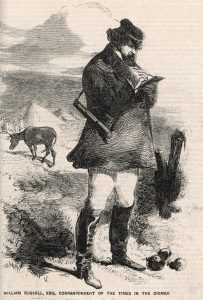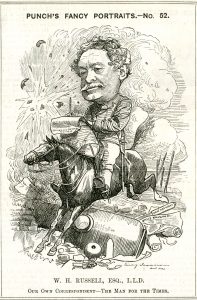William Howard Russell (1820-1907)
William Howard Russell’s graphic coverage of the Crimean War in 1854-55 for the Times has earned him a lasting reputation as the ‘first Special Correspondent’. Although he was not in fact the first to report from the seat of war for a daily newspaper, he inaugurated a new genre of journalism characterised by vivid, discursive, eyewitness accounts that were based on professional investigation and distinguished by their narrative vigour and immediacy. Russell’s reports from the Crimea brought the war home to British readers and galvanised public opposition to the Government’s mishandling of the campaign. His narratives of spectacle, heroism and suffering made his name – despite the conventional practice of journalistic anonymity – establishing him as the Times’ leading special. Dressed in quasi-military uniform, his popular identification as ‘Crimean Russell’ is captured in the engraving from the Illustrated Times of 6 October 1855.

‘Sir William Howard Russell, British war correspondent for The Times, reporting from the Crimea in 1855’. Unattributed engraving in Illustrated Times, 6 October 1855, p. 293.
© Mary Evans Picture Library
Russell was subsequently sent to cover the Indian Mutiny in 1857, the American Civil War in 1861-62, the Austro-Prussian war in 1866, the Franco-Prussian war of 1870-71 and the Zulu war of 1879, where his crusading zeal continued to manifest itself in critical reports on the realities of armed conflict for those directly involved. Punch’s ‘Fancy Portrait’ of Russell by Linley Sambourne, published in 1881, celebrates his reputation as a war correspondent.

[Linley Sambourne,] ‘Punch’s Fancy Portraits – No. 52: W.H. Russell, Esq., L.L.D.’, Punch, 8 October 1881, p. 166.
Image courtesy of the British Cartoon Archive, University of Kent. www.cartoons.ac.uk